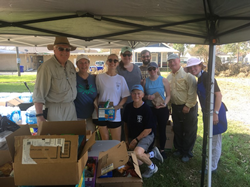
Volunteers provided and distributed food, paper goods, cleaning supplies and personal essentials to over 125 cars on the grounds of St John’s Episcopal Church in Thibodaux, Louisiana.
“The dioceses of Louisiana and Western Louisiana have extensive experience in responding to hurricanes. Their experience and preparation enable them to quickly respond with assistance where it is most needed, both in the short-term and in the years to come,” said Katie Mears.
NEW YORK (PRWEB)
September 09, 2021
Episcopal Relief & Development is partnering with the Episcopal dioceses of Louisiana and Western Louisiana to provide aid such as temporary housing, food, gas money and other emergency supplies to communities in storm-damaged areas and to people who have evacuated their homes due to the flooding and power outages.
As of Wednesday morning, September 8, over 320,000 people remain without power in Louisiana, one week after Hurricane Ida struck the area as a Category 4 hurricane. Experts estimate the total damage from Ida will exceed $50 billion. The lack of power, particularly given the heat and humidity, makes many homes uninhabitable, even if they were not damaged by the storm. Without power, there is no air conditioning, refrigeration for food, or ability to clear out floodwaters. Mold and waterborne illness are a concern. As a result, many have evacuated the area and are staying in temporary housing and shelters elsewhere in the region until it is safe to return.
With Episcopal Relief & Development’s support, the Episcopal Diocese of Louisiana is meeting urgent needs in three different ways. First, the diocese is providing emergency relief, such as personal care items and food, to people in storm-damaged areas throughout the state. Diocesan leaders are also assisting evacuees who are unable to return to their homes by supplying gift cards and cash to help evacuees with gas, food, rental assistance and emergency supplies. Finally, staff are distributing tents and tarps to provide shelter for vulnerable people who had already been experiencing homelessness and have lost their belongings in the storm.
The Episcopal Church in Western Louisiana is also supporting evacuees who are unable to return home yet. With Episcopal Relief & Development’s support, diocesan leaders are distributing gift cards and personal care items to evacuees at shelters and local motels. The diocese is proactively visiting motels to provide evacuees with assistance for lodging costs and utilities.
“As power is being restored in some areas and roads are being cleared, people are beginning to return to their homes and the extent of the damage is becoming more clear,” said Katie Mears, Senior Director, US Disaster Program, Episcopal Relief & Development. “The dioceses of Louisiana and Western Louisiana have extensive experience in responding to hurricanes. Their experience and preparation enable them to quickly respond with assistance where it is most needed, both in the short-term and in the years to come.”
Episcopal Relief & Development US Disaster Program staff are working closely with partners throughout the Gulf Coast as they continue to identify ways to collaborate in meeting needs created by the hurricane.
Please continue to pray for everyone who has been affected by Hurricane Ida. Donations to Episcopal Relief & Development’s Hurricane Relief Fund will provide additional emergency relief in communities impacted by storms such as Ida.
About Episcopal Relief & Development:
For over 80 years, Episcopal Relief & Development has been working together with supporters and partners for lasting change around the world. Each year the organization facilitates healthier, more fulfilling lives for more than 3 million people struggling with hunger, poverty, disaster and disease. Inspired by Jesus’ words in Matthew 25, Episcopal Relief & Development leverages the expertise and resources of Anglican and other partners to deliver measurable and sustainable change in three signature program areas: Women, Children and Climate.
Share article on social media or email:

